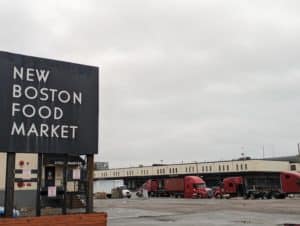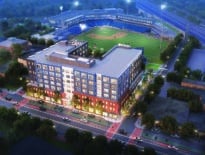The real estate investor that controls Boston’s Widett Circle once envisioned a 24 million-square-foot development spanning approximately 100 acres off Interstate 93, including a new Boston City Hall and 30-acre central park.
The MBTA’s December decision to seek to acquire Widett Circle for a new commuter rail storage yard appears to have squelched developer Able Co.’s larger vision for the industrial area, which includes MBTA rail and maintenance properties and the city of Boston’s 18-acre Frontage Road tow lot and public works garage.
The firm was founded in 2018 by Bill Keravuori, a former managing director at Boston developer The Abbey Group. The Able Co. has remained silent about its plans for Widett Circle, and hasn’t filed any proposals with the Boston Planning & Development Agency.
But in an Oct. 31 submission to the city of Medford about a potential development at the MBTA’s Wellington station, The Able Co. described a Widett Circle development that would have dwarfed New York’s Hudson Yards: a “full neighborhood, including office, manufacturing, worker housing, civic buildings (including proposed new city hall) with central 30-plus acre park with playing fields and performance space.”
Project Included Marquee Investors
The discussions with Boston and Massachusetts Department of Transportation officials progressed far enough that the three sides signed an agreement to collaborate on a large-scale development.
A March 22, 2021 agreement that was signed by former Boston Mayor Marty Walsh, former Boston Planning and Development Agency Director Brian Golden, former MBTA General Manager Steven Poftak and outgoing Massachusetts Department of Transportation Secretary Jamey Tesler laid the groundwork for a large public-private development.
The agreement mentioned reconfiguring public ways and potential land transfers to improve access to the area “consistent with the private redevelopment and the MBTA’s goals.”
The expression of intent and cooperation, obtained from MassDOT this week by Banker & Tradesman under a public records request, includes the parcels on Widett Circle and Foodmart Road, the MBTA’s existing service and inspection facility and a 1-acre parcel owned by the BPDA.
It mentions a distribution center as an “interim step” in a long-term planning process for the area.
The Able Co. declined to comment.
The Able Co. has controlled the 24-acre Widett Circle and Foodmart Road properties, including the Boston Food Market wholesalers hub and a cold storage warehouse, since 2020. Its ownership team includes the nation’s second-largest pension fund CalSTRS, and construction company Suffolk’s investment arm.
The property was originally developed for food wholesalers displaced by Quincy Market’s conversion to retail space. It emerged as Boston’s most-watched real estate site after the city proposed a 60,000-seat stadium as part of the city’s bid to host the 2024 Olympics.
The Able Co. submission states the project would have included Widett Circle along with city- and state-owned parcels. Widett Circle borders Boston’s 18-acre Frontage Road tow lot and public works garage, and the MBTA owns a group of parcels in the area, including Dorchester Avenue, Foundry Street and West Fourth Street.
The project would have included an electrified bus maintenance facility and depot, the Wellington submission states.
City Wants a Say on MBTA’s Plan
The MBTA settled on Widett Circle as a preferred location for the layover station to increase the capacity of the commuter rail network connected to South Station, including the new South Coast rail project. The layover facility also is designed to increase service along the Fairmount commuter rail line, potentially enabling the MBTA to add new stations in Boston.
At the December meeting, the MBTA board voted to authorize $155 million for the acquisition.
Boston officials have eyed both Widett Circle and the city’s Frontage Road property to address a variety of goals, including housing production and coastal resiliency. Potential redevelopment of Frontage Road, proposed in 2018 by former Mayor Marty Walsh, hinged upon the city’s selection of an alternative site for the public works garage and vehicle impound lot.
The MBTA said it will include the city of Boston and the future of the Frontage Road parcels in its planning process. In an email, MBTA spokesman Joe Pesaturo said the the layover “yard’s design will endeavor to accommodate a future air rights development.”
As a Boston city councilor, Mayor Michelle Wu was outspoken about her preference that any redevelopment of Frontage Road include workforce and affordable housing and open space.
And in a 2021 interview with Banker & Tradesman’s editorial board, Wu said the state and city should collaborate on a master plan for Widett Circle and Frontage Road.

Steve Adams
“It is just so rare that in a city as dense and historic as Boston, that we have such a large swath of land that includes significant public ownership – and not just city ownership, but state ownership – making up two-thirds of that area. We should have a master plan that looks at how all of that could fit together,” Wu said, adding that the property “could tie into a solution for our growing housing pressures.”
In a statement this week, Wu didn’t specifically address her administration’s goals for Widett Circle, focusing on the potential benefits to MBTA riders and changes she hopes to see in MassDOT’s design for a future West Station as a result of a railyard on the Widett properties.
“This deal could finally set us on the path to frequent, reliable, and electrified regional rail service, while removing rail layover from neighborhoods in transformation like Allston,” Wu stated. “I look forward to seeing additional details soon from the MBTA.”
In a statement, Boston City Council President Ed Flynn said in any proposal to redevelop Widett Circle and Frontage Road, “it is critical that the city, state, and a developer work closely to collaborate on issues of affordable housing, our economic vitality, transportation, parks, civic space and climate resiliency.”
Editor’s note: This report has been updated with details about the contents of the agreement between The Able Co., Massachusetts Department of Transportation, MBTA, city of Boston and BPDA.




 |
| 

